Related Research Articles

John Lee Hooker was an American blues singer, songwriter, and guitarist. The son of a sharecropper, he rose to prominence performing an electric guitar-style adaptation of Delta blues that he developed in Detroit. Hooker often incorporated other elements, including talking blues and early North Mississippi hill country blues. He developed his own driving-rhythm boogie style, distinct from the 1930s–1940s piano-derived boogie-woogie. Hooker was ranked 35 in Rolling Stone's 2015 list of 100 greatest guitarists, and has been cited as one of the greatest male blues vocalists of all time.
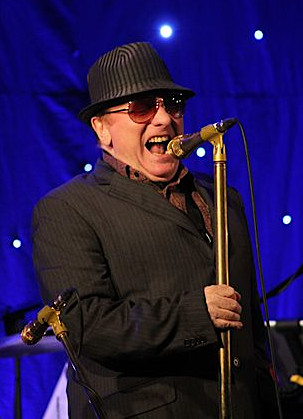
Sir George Ivan MorrisonOBE is a singer-songwriter and musician from Northern Ireland whose recording career spans seven decades.
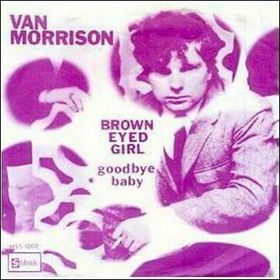
"Brown Eyed Girl" is a song by Northern Irish singer and songwriter Van Morrison. Written by Morrison and recorded in March 1967 for Bang Records owner and producer Bert Berns, it was released as a single in June of the same year on the Bang label, peaking at No. 10 on the Billboard Hot 100. The song spent a total of sixteen weeks on the chart. It featured the Sweet Inspirations singing back-up vocals and is considered to be Van Morrison's signature song.

Too Long in Exile is the twenty-second studio album by Northern Irish singer-songwriter Van Morrison. The album was produced by Morrison and draws on urban blues and soul jazz sounds, including collaborations with John Lee Hooker and Georgie Fame. Released in 1993 by Polydor Records, Too Long in Exile received positive reviews from most critics and reached #4 on the UK Albums Chart. It reached #29 in the US, Van Morrison's highest ranking since 1978's Wavelength (#28) and until 1999's Back on Top (#28).

The Healing Game is the twenty-sixth studio album by Northern Irish singer-songwriter Van Morrison, released in 1997 by Polydor. It reached the Top Ten in four countries, and the Top Twenty in three more. Following two overtly jazz albums, it saw Morrison adding blues and a pop sensibility. It is the only album recorded after 1980 which Rolling Stone judged to be among his ten best, calling it "a clear highlight of his mid-period discography".

The Angry Young Them is the first album by the Northern Irish rock and roll group Them, whose lead singer and songwriter was Van Morrison. The album was released in the UK in June 1965. In the U.S., the album was released as Them with partly different tracks.
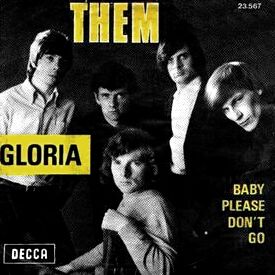
"Gloria" is a rock song written by Northern Irish singer-songwriter Van Morrison, and originally recorded by Morrison's band Them in 1964. It was released as the B-side of "Baby, Please Don't Go". The song became a garage rock staple and a part of many rock bands' repertoires.

"Baby, Please Don't Go" is a traditional blues song that was popularized by Delta blues musician Big Joe Williams in 1935. Many cover versions followed, leading to its description as "one of the most played, arranged, and rearranged pieces in blues history" by French music historian Gérard Herzhaft.

The Best of Van Morrison Volume Two is a compilation album by Northern Irish singer-songwriter Van Morrison released in 1993.
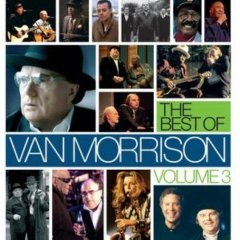
The Best of Van Morrison Volume 3 is a compilation album by Northern Irish singer-songwriter Van Morrison released on 11 June 2007 in the UK with a digital version released in the U.S. on iTunes Store on 12 June 2007. Manhattan/EMI Music Catalog Marketing released the CD version of the album on 19 June 2007 in the United States. This new two-disc collection of 31 tracks was compiled by Morrison himself. It offers an overview of his large volume of material since the release of The Best of Van Morrison Volume Two in 1993. The album's thirty-one tracks include previously unreleased collaborations with Tom Jones and Bobby Bland as well as duets with John Lee Hooker, B.B. King and Ray Charles. The 2003 duet with Ray Charles is "Crazy Love", a song originally recorded on Morrison's 1970 album Moondance. "Blue and Green" was previously donated to be used on the charity album Hurricane Relief: Come Together Now, which raised money for relief efforts intended for Gulf Coast victims devastated by hurricane Katrina. The duet with Tom Jones, "Cry For Home", was taken from the same recording sessions that produced the "Sometimes We Cry" duet between the two artists, which featured on Jones' successful album Reload. "Cry for Home" was released as a single on 4 June 2007 in the UK, and was followed by "Blue and Green" on 27 August.
"Vanlose Stairway" is a song written by the Northern Irish singer-songwriter Van Morrison, and included on his 1982 album Beautiful Vision. It has remained a popular concert performance throughout Morrison's career and has become one of his most played songs.

"The Healing Game" is the title song on Northern Irish singer-songwriter Van Morrison's 1997 album. It was released twice as a single in 1997 as an A-side with different B-sides – including "Have I Told You Lately" and "Gloria". The single reached number 46 in the UK.

"Dimples" is a song written and recorded by blues singer-songwriter John Lee Hooker in 1956. It is an ensemble piece, with Hooker accompanied by Jimmy Reed's backup band. Eight years after its first release, it became Hooker's first record to appear in the British record charts. Called a "genuine Hooker classic" by music critic Bill Dahl, it is one of his best-known songs, with interpretations by several artists.

Mr. Lucky is a 1991 album by American blues singer, songwriter and guitarist John Lee Hooker. Produced by Ry Cooder, Roy Rogers and Carlos Santana under the executive production of Mike Kappus, the album featured musicians including Keith Richards, Blues Hall of Fame inductee Johnny Winter; and three inductees of the Rock and Roll Hall of Fame, Van Morrison, Booker T. Jones and Johnnie Johnson. And also Chester D. Thompson, who once played with Santana, on keyboards, has collaborated on writing a song on the album. Released on Virgin Records, including on its imprint label Classic Records, Mr. Lucky peaked at #101 on the "Billboard 200". Chester D. Thompson should not be mistaken with Chester Cortez Thompson, a drummer who also played with Santana, Frank Zappa and The Mothers of Invention, Weather Report, Genesis and Phil Collins.
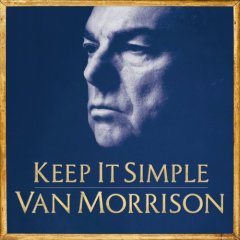
Keep It Simple is the thirty-third album by Northern Irish singer/songwriter Van Morrison, released in March 2008. It was Morrison's first US Top 10 album, and made the Top 10 in the UK, Canada and in some European countries. It was his first studio album of all new original material since Back on Top (1999), and includes elements of jazz, folk, blues, celtic, country, soul and gospel.

Van Morrison in Ireland is the first official video by Northern Irish singer-songwriter Van Morrison, released in 1981 of a concert Morrison recorded in Northern Ireland in 1979. It was directed by Michael Radford who later became a noted filmmaker. The video includes footage of the band whilst touring in Ireland and images of Belfast, including Hyndford Street and Cyprus Avenue. Tony Stewart of the NME states, "The band display a range of textures reminiscent of The Caledonia Soul Orchestra, first with the dark resonance of Toni Marcus' violin, then Pat Kyle's bright sharp tenor sax and finally Bobby Tench's prickly electric guitar".

Don't Look Back is an album released by blues singer-songwriter John Lee Hooker in 1997 that was co-produced by Van Morrison and Mike Kappus. Van Morrison also performed duets with Hooker on four of the tracks. The album was the Grammy winner in the Best Traditional Blues Album category in 1998. The title duet by Hooker and Morrison also won a Grammy for Best Pop Collaboration with Vocals.

"I Cover the Waterfront" is a 1933 popular song and jazz standard composed by Johnny Green with lyrics by Edward Heyman. The song was inspired by Max Miller's 1932 best-selling novel, I Cover the Waterfront.
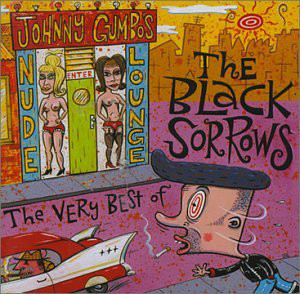
The Very Best of the Black Sorrows is the second greatest hits album by Australian rock and blues band The Black Sorrows. The album includes 38 songs from the band's entire career and includes singles and album tracks, all of which are digitally remastered. The album was released in Australia in 1997 and internationally on 25 August 1998. The album is considered a collectors item by The Black Sorrows' fans.
References
- ↑ "John Lee Hooker - Send Me Your Pillow". 45cat.com. Retrieved 31 May 2021.
- ↑ "John Lee Hooker: The Modern Recordings". Rubbercityreview.com. 28 December 2012. Retrieved 12 March 2014.
- ↑ "JOHN LEE HOOKER – DON'T LOOK BACK". Swisscharts.com. Retrieved 12 March 2014.
- ↑ Marshall, Matt (7 June 2012). "John Lee Hooker "Cook With The Hook: Live 1974″ on DVD June 19". Americanbluesscene.com. Retrieved 12 March 2014.
- ↑ "The Angry Young Them - Them | Songs, Reviews, Credits". AllMusic . Retrieved 31 May 2021.
- ↑ "The Best of Van Morrison, Vol. 2 - Van Morrison | Songs, Reviews, Credits". AllMusic . Retrieved 31 May 2021.
- ↑ John Lee Hooker – The World´s Greatest Blues Singer Hooker discography, Rhythm-and-blues.info, retrieved November 22, 2016
- ↑ "Sonola - The Black Sorrows | Songs, Reviews, Credits". AllMusic . Retrieved 31 May 2021.